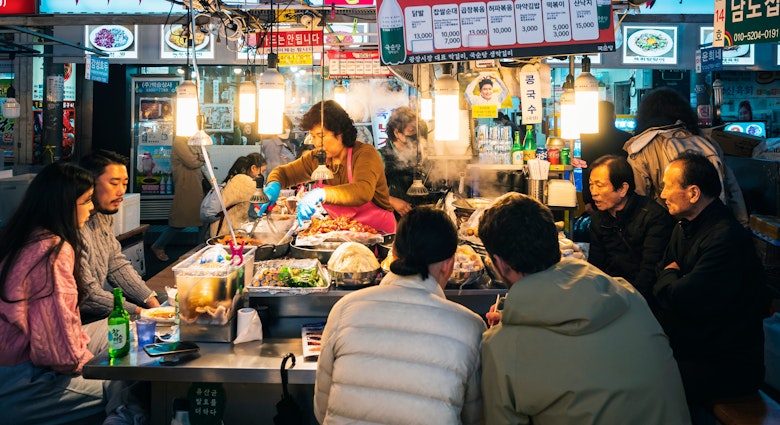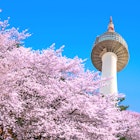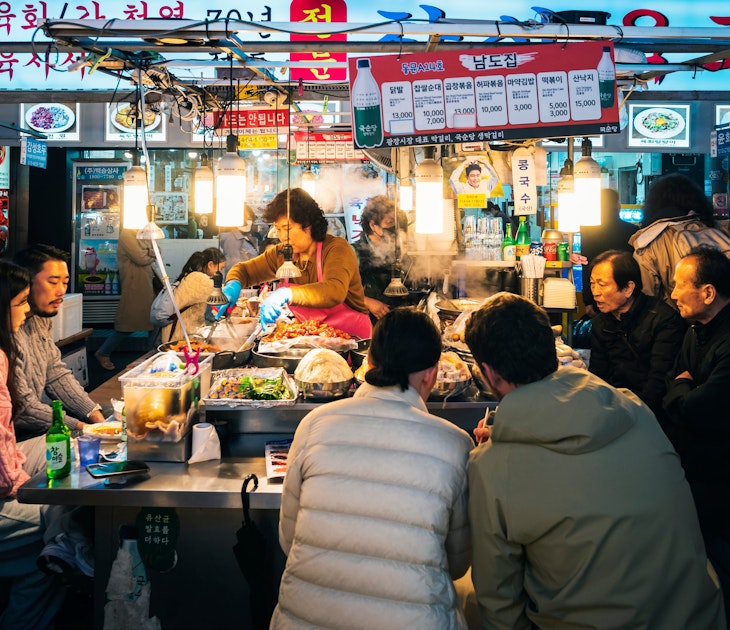
The 8 best museums in Seoul for art, history and even kimchi
Jun 22, 2022 • 7 min read

Visit one of Seoul's varied museums to gain insight into what makes the city (and country) tick © Wang Yiliang / Getty Images
With ultra-modern skyrises alongside small one-story hanoks (traditional Korean homes), Seoul is often described as a city of old and new, and this description applies to the range of museums as much as the city’s architecture.
The South Korean capital isn’t particularly known for museums, but several have opened in the past two decades with their exhibits ranging from traditional to the niche. Here are our favorite museums for learning about South Korean history, contemplating modern artwork and having a bit of fun.
Discover 30+ top Seoul attractions all on one pass with Go City. Pick between a 1 to 5- day All-Inclusive Pass and brave the thrill rides at Lotte World, visit the border on a Demilitarized Zone Tour, enjoy the views from N Seoul Tower, and much more!

National Museum of Korea
Best museum for all things Korean
The museum to visit if you have time for only one, the National Museum of Korea has a range of artifacts, documents and artworks detailing Korean history and art. This huge museum is the size of 56 football fields, and it’s split across three main floors that cover it all, from ancient and pre-history to sculpture and arts. Don’t miss the monumental jar coffins from the Baekje period (18 BCE–660 CE), the Tigers in Moonlight and Pine Grove painting from the Joseon dynasty and the 10-story stone pagoda from Gyeongcheonsa Temple – a stately marvel located prominently near the museum’s entrance.
The premises also include an immersive digital gallery, a children’s museum full of interactive experiences and expansive outdoor grounds with a botanical garden, small waterfall and several ponds. The National Hangeul Museum, devoted to the education of hangeul (Korean alphabet), is next door and worth visiting if a special exhibition is taking place.
War and Women's Human Rights Museum
Best museum for a moving experience
A small but memorable museum, the War and Women's Human Rights Museum uses art and audio to educate visitors on the history of comfort women (women used as sexual slaves during World War II). Each visitor is given an audio guide that provides additional context to the items on display.
Listening to the survivors’ voices and learning their names is a powerful experience. The information can be a lot to take in, but the museum does a great job of emphasizing hope and life after trauma. Although history museums in Korea are hesitant to be critical of its own participation in war crimes, this museum is unique in its recounts of wrongs done by the Korean government.

Seoul Museum of History
Best museum to get to know the city
Over the years, Seoul has been known by several names, and the city has undergone radical changes, even in the past century. The Seoul Museum of History examines these shifts through artifacts, art, maps and photography.
The permanent exhibition starts with Seoul's origin as the Joseon capital in 1392 and extends through predictions about Seoul’s future; it also hosts special exhibitions on fashion, photography and historic urban planning. Plan for a little extra time at the “Period of Rapid Growth Seoul” section to compare photographs of the city from now and 50 years ago for a better grasp of just how quickly the city has developed. A highlight is “Suite No. 9-xxx of Seocho Samho Apartment,” a model of an apartment complex in Gangnam in the 1970s.
Korea Furniture Museum
Best museum for unexpected luxury
How does a furniture museum become a must-see spot for celebrities, influencers and important foreign officials? It doesn’t make sense until you’ve actually visited the Korea Furniture Museum, which requires a guided tour to see.
This museum contains director Chyung Mi-sook’s personal collection of approximately 2500 traditional wooden pieces that are laid out over 10 hanoks. You get a real sense of how the upper class lived during the Joseon dynasty (1392–1897), and the tour gives context to how items like carefully crafted soban (small portable tables), book storage chests and jewelry boxes with intricate designs were created and used.
Seeing the delicate pieces up close without any glass cases truly differentiates this museum visit from others, and the guides' stories are excellent. The museum only runs a handful of tours to a limited number of visitors per day; guided tours must be reserved in advance on the museum’s website and are often booked out months ahead.

National Museum of Modern and Contemporary Art
Best museum for lovers of modern art
The MMCA has three branches, but the location near Gyeongbokgung Palace is the newest and considered the institution’s representative. The museum does exhibit internationally recognized artists, but the gallery’s primary focus is highlighting the works of contemporary Korean artists.
Exhibitions include retrospectives on well-known Korean artists such as Park Soo Keun, Park Seo-bo and Lee Kyungsung, and collections from rising artists, including recipients of the Korea Artist Prize, which is awarded to contemporary Korean artists pushing boundaries in the scene.
The space can be a bit disorienting because the gallery numbers aren’t clearly marked, and it can be difficult to determine the best order to view the exhibition. However, the curation of works is unlike anything else you’ll find in the country. The gift shop, full of books and art-inspired souvenirs, is also worth a look. Where else could you find a Nam June Paik collection of stickers and postcards of works by Kim Whanki?
Yun Dong-ju Literature House
Best small museum
The niche Yun Dong-ju Literature House details the life and works of one of Korea’s best-known poets and independence activists, Yun Dong-Ju (1917–45). While the museum looks like an ordinary white building at first glance, the structure, designed by architect Lee So-jin, was actually a trio of water pressure tanks in its past life. The moodiness of the concrete encasings plays a big role in the overall feel of the space.
The museum is divided into three parts: a display of Yun’s manuscripts and photographs (only partially translated to English), a walk-through of Open Well (a former water tank with no roof) and a short film about Yun in Closed Well (a dark water tank with minimal light). The museum paints an intimate portrait of the poet, whether or not you’re already familiar with his work.
Seoul Children’s Museum
Best museum for families
A highly interactive museum that taps into the imagination, the Seoul Children’s Museum is a four-story space with exhibitions, playrooms and classes suitable for kids from 3 to 12 years old. Highlights include the Dance Energy Floor, an electronic floor that encourages kids to jump on tiles that light up, and the Water Pump at the “Science Play” exhibition that teaches children about the movement of water.
Incorporating science and physical education into all the activities, the museum is a space where kids can expend their energy and learn valuable lessons. Check the museum’s website for information on how parents can best lead their kids through these exhibitions as well as a schedule of classes.
Museum Kimchikan
Best museum for foodies
Can’t get enough of the fermented cabbage dish served with most of your Korean meals? Did you know that red pepper flakes are a relatively recent addition to the dish? The small Museum Kimchikan in Insadong is dedicated to all your kimchi queries, helping visitors get a lesson on one of the most famous Korean dishes.
Here at the nation’s most established food museum, you can learn about the communal nature of kimchi preparation, study the evolution of kimchi throughout the centuries and admire the dozens of kimchi varieties on display. Find out all the ways kimchi can be used, get tips on fermenting at home and sample kimchi varieties.
One of the main draws of the museum? Its inexpensive kimchi-making classes. The museum website lists two types of kimchi-making classes, but the 40-minute intensive course on Wednesdays and Thursdays requires an email reservation in advance.
Is the Discover Seoul Pass worth it?
The Discover Seoul Pass, a discount card for tourists, covers several of these museums, but before you visit Seoul, compare the museums listed on the pass with your Seoul itinerary and calculate its benefit to your visit. Many museums are low cost or free, so the Discover Seoul Pass might not be worth it.
Explore related stories







 ActivitiesTop 11 things to do in Fayetteville, North Carolina, for couples, families and history buffs
ActivitiesTop 11 things to do in Fayetteville, North Carolina, for couples, families and history buffsJun 9, 2022 • 6 min read


